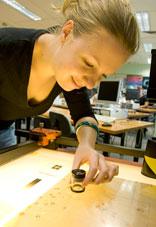Study Opportunities
 For information on the degrees offered by the School of Physics and research projects on offer within the Astrophysics group.
For information on the degrees offered by the School of Physics and research projects on offer within the Astrophysics group.
The School of Physics offers undergraduate Bachelor of Science degrees with majors in Physics or Mathematical Physics, as well as postgraduate Masters and Doctorate degrees. While astrophysics subjects may be taken at undergraduate level, it is suggested that the specialisation in astrophysics be taken at postgraduate level – either within the degrees of Masters or Doctorate.
As of 2009, our new Masters of Science – Physics degree – the only one of its kind in Australia – offers the opportunity to undertake advanced coursework and an astro research project supervised by one of our teaching and research staff (sometimes known as ‘faculty’). Below is a list of supervisors, with links to their profiles, along with research higher degree projects on offer.
Prof Rachel Webster
- Gravitational lensing
- Quasar astrophysics
- Galaxy formation
- Large-scale structure and cosmology
- Projects for secondary physics students
Prof Andrew Melatos
- Theory of gravitational waves radiated by neutron stars and black holes: new sources for LIGO
- Gravitational waves from supernova explosions
- Fundamental theory of rotating superfluids and quantum condensates
- Quantum vortices and superfluid turbulence in nuclear matter: the mystery of neutron star glitches
- Relativistic electron-positron winds and jets in supernova remnants
- Origin of magnetic fields in supernovae, neutron stars, black holes, and accretion disks
- Signal templates and algorithms for gravitational wave data analysis
Prof Michele Trenti
- Formation and evolution of the first galaxies (observations and theory)
- First stars and metal enrichment during the epoch of reionzation
- Galaxy evolution
- Gamma Ray Bursts as tracers of (faint) star forming galaxies
- The SkyHopper CubeSat (science and engineering)
- Dynamical evolution of stellar systems
A/Prof Christian Reichardt
- Inflation and inflationary gravitational waves
- Cosmological probes of neutrino physics
- Dark energy
- Polarisation of the cosmic microwave background
- Gravitational lensing of the cosmic microwave background
- Polarized mm-wave foregrounds
If you are interested in joining the Astrophysics group either as a postgraduate student or postdoctoral fellow, please email your full CV, academic transcript and referees when making contact with teaching and research staff.